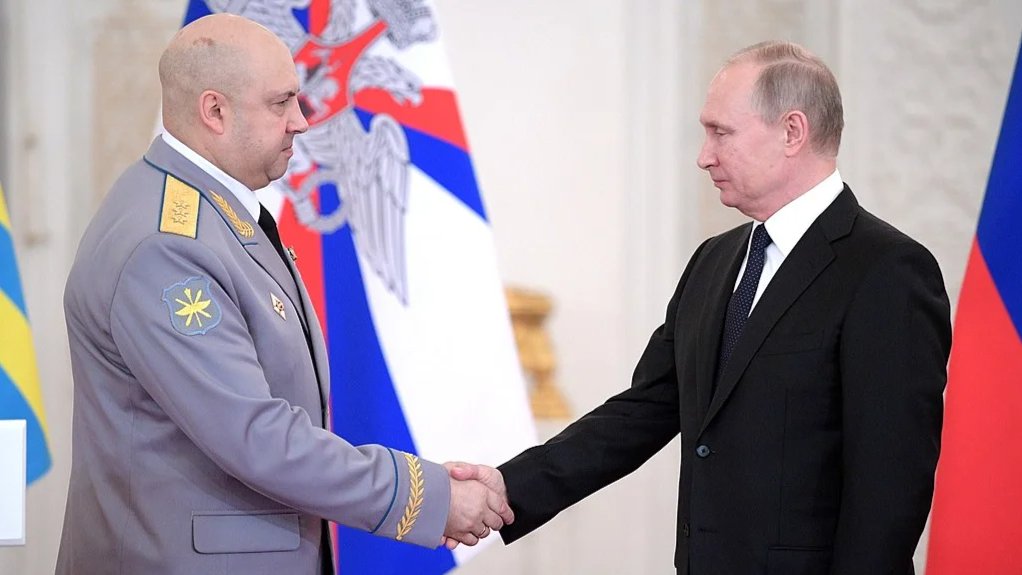Today’s missile attacks on the centre of Kyiv and on eight regions of Ukraine are not only the results of Putin’s anger in response to the explosion of the Crimea bridge.
They are also the results of the official appointment of army general Sergei Surovikin as the commander of the troops in Ukraine. General Surovikin was responsible for Mariupol, and we remember how he dealt with that.
It was the same in Aleppo, whose storming he commanded in Syria. He wiped Aleppo from the face of the earth — in the same way he did with Mariupol.
The difference is that when he wiped Mariupol from the face of the earth, Russian aviation forces could proceed to easily bomb theatres, schools, and maternity hospitals. And now they can’t just hurl FAB aerial bombs — now there are air defence systems. Instead, they have to nail them with missiles.
“The missile attacks came in two waves,” says military expert Roman Svitan, a pilot in the Ukrainian Armed Forces and reserve colonel. “The first wave deliberately struck civilian targets, and the second was probably intended to cut off power from infrastructure or hit military targets.”
The main purpose of the first wave was to overwhelm the air defence systems. Let’s say, for example, there’s an S-300 missile system, and it holds a certain number of rockets. It shoots all these rockets during the first attack, and if the second wave follows on the heels of the first, there’s no time to reload. This is why the first missile strikes were aimed at civilian targets.
If a rocket is aimed at a military target, there might be some question for air defence of whether to intercept the missile or not. If it’s flying into a high-rise apartment building, there’s no choice — you have to intercept it.
It’s easy to understand, then, why the first wave comprised anti-ship missiles of the Kh-22 type with circular error probable of 300 metres, while the second wave made use of the more accurate “Kalibr” missiles.
In this respect, the tactics of the new commander at first glance seem cannibalistic, but with quite a clear military-terrorist strategy.
Missile-based terror used to be one of Putin’s primary solutions to failures on the front, but it’s easy to observe that the use of the strategy has weakened recently, and for a very respectable reason: Putin has fewer and fewer precision missiles. “It’s clear that Surovikin dipped into the emergency reserve,” Svitan says. The reserve can be immediately deployed at the order of the commander.
In this way, Surovikin shows off his resolve for his boss. You appointed me, now here’s how I’ll fight for you. “That’s his calling card,” Svitan concludes. Surovikin is striking to win Putin’s good favour.
However, there is another detail in this story that we can’t afford to overlook.
Until now, the names of the generals leading the forces in Ukraine have not been officially announced. Yes, there was a war — but who was commanding it was not officially known. Putin didn’t want to share the glory of victory with any general — nor for a general to assume authority that would allow him to usurp Putin.
Some sources claimed that the commander was general Alexander Dvornikov, while others named Gennady Zhidko. However, Leonid Nevzlin, a former shareholder of Yukos, has maintained ever since the beginning of the war that all operations were commanded by Sergei Surovikin (or, in any case, that he was one of the key players). It was him that Nevzlin named as a hypothetical member of the military junta that could replace Putin.
In this situation, the publicised appointment of general Surovikin seems like yet another important move in the administrative war, and this move is not at all in Surovikin’s interest. Putin had previously kept the leaders of the war anonymous so that they would not compete with him for recognition. Now he appoints a scapegoat. If the war had been victorious, it would have been Putin who won it. Now that they are losing it, it will be General Surovikin who will lose it.
At least that is what Putin is striving for.
And he will continue to strive for it.
For the first time since the beginning of the war, these missile attacks are not just the result of powerless anger. They are not a way to distract Z-patriots from the humiliating defeats at the front. These missile attacks — and the corpses of Ukrainian civilians — are the first military strikes in an internal struggle for the throne.
Join us in rebuilding Novaya Gazeta Europe
The Russian government has banned independent media. We were forced to leave our country in order to keep doing our job, telling our readers about what is going on Russia, Ukraine and Europe.
We will continue fighting against warfare and dictatorship. We believe that freedom of speech is the most efficient antidote against tyranny. Support us financially to help us fight for peace and freedom.
By clicking the Support button, you agree to the processing of your personal data.
To cancel a regular donation, please write to [email protected]

